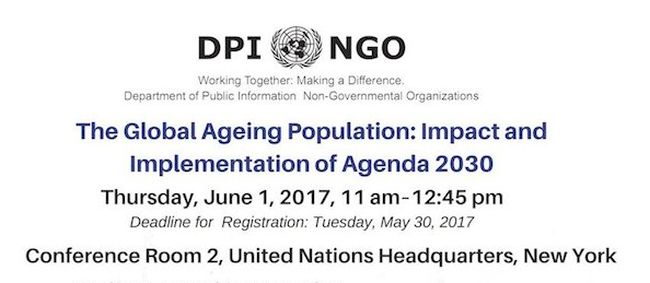26th May 2017
Population ageing together with globalization and urbanization characterize the major demographic upheavals of our time. A new narrative is beginning to emerge globally where older persons are viewed legitimate participants and contributors to society.

Using the narrative as a backdrop, the speakers will address the social and economic opportunities with longevity; ageism as a fundamental barrier to healthy ageing; environments such as age-friendly created to enable older people to do what they value; and the complementary roles of the United Nations and member countries and NGOs to assure “no one is left behind as the UN looks to 2030 and beyond.”
Speakers include: Greg Shaw (IFA), Ursula M. Staudinger, Ph.D. (Columbia Aging Center/ILC USA), Janet A. Sigal, Ph.D. (MGO Committee on Aging/NY), Ruth Finkelstein, Sc.D. (Columbia Aging Center/ILC USA), Rosemary Lane, M.A. (UN DESA and UN Focal Point on Ageing). The session will be moderated by Cynthia Stuen, Ph.D. (IFA).
The session will be webcast. For information, please visit: http://webtv.un.org
For further information, visit:
Dynamic knowledge synthesis in local networks for coherent elderly care
We are getting older and more diverse, and that brings challenges. We cannot solve these challenges through healthcare alone. We also need municipalities, schools, companies, housing associations and older people themselves to achieve an age-friendly society. This requires cross-domain collaboration. But how can we achieve that?
25 April 2024
Event summary – Healthy ageing and longevity in Europe: How do we prepare for the 100-year life?
In partnership with ILC-UK, the ILC Europe Network hosted its inaugural conference in Brussels on 6 March 2024 to explore the challenges and opportunities associated with an ageing European society. Other ILC Global Alliance members in attendance included ILC-Czech Republic, ILC-France and ILC-Netherlands.
March 2024
White paper Arts in Health in the Netherlands: Art deserves a prominent place in healthcare
Much more attention needs to be paid to the positive effects of the use of art in healthcare. Art makes people feel better and helps them to better cope with their illness. Art can also mean a lot in the social domain and prevention, and in shortening hospital admissions.
February 2024


